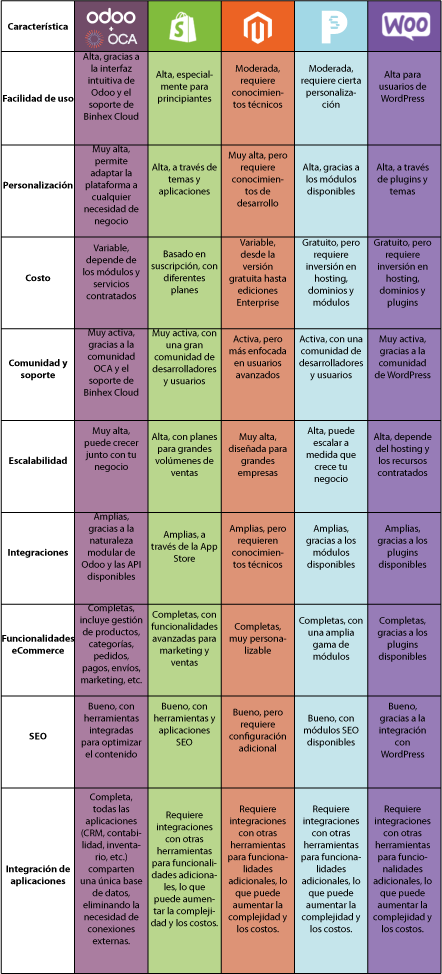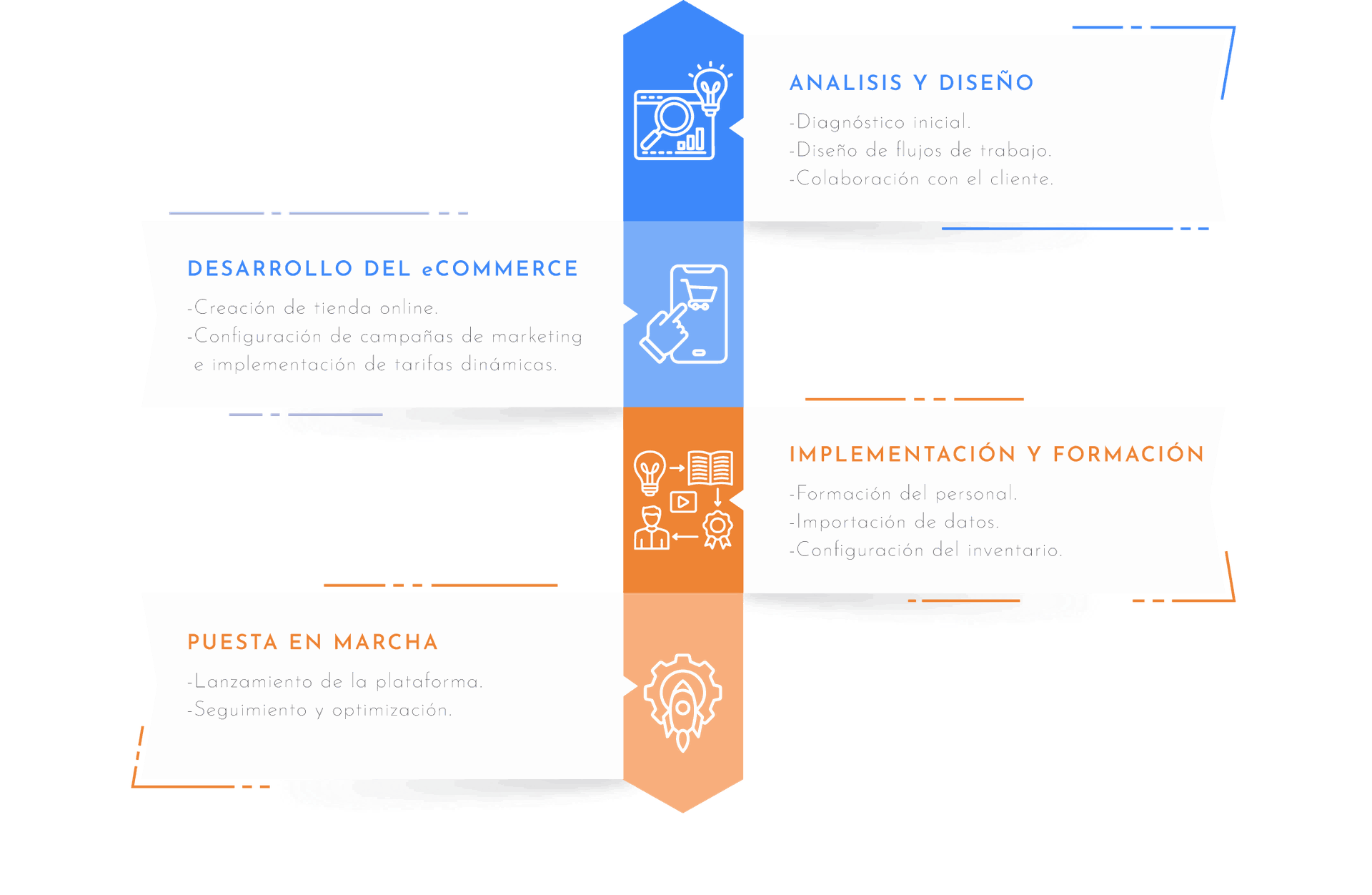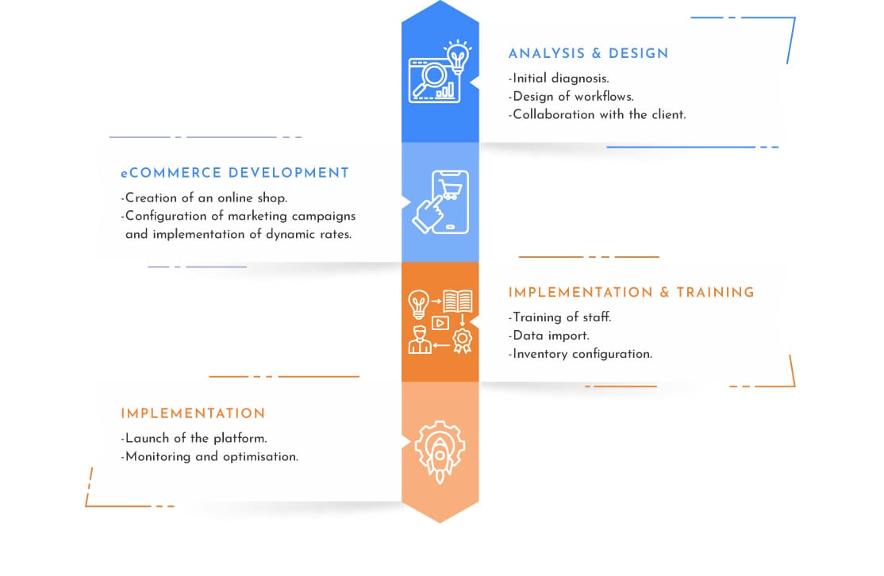Shopify eCommerce: Is It the Best Solution for Your Business?
Today’s eCommerce market is a highly competitive and constantly evolving landscape. The pandemic drastically accelerated the shift to digital shopping, and now businesses of all sizes recognize the importance of having a strong online presence.
This surge has led to a wide range of platforms for eCommerce, each with its own strengths. Among the most popular are Shopify, known for its ease of use and wide variety of templates; Magento, ideal for large enterprises that require high customization and scalability; PrestaShop, a flexible, open-source option popular among small and medium-sized businesses; and WooCommerce, a WordPress plugin that offers easy integration with other WordPress tools.
Shopify vs Odoo: Detailed Comparison for 2024
Odoo vs. Shopify, Magento, PrestaShop, and WooCommerce
When choosing a platform for your online store, the decision can be overwhelming. The market offers a wide variety of options, each with its own features and advantages. In this comparison, we take an in-depth look at the five most popular eCommerce platforms: Odoo, Magento, Shopify, PrestaShop and WooCommerce.
Through this table, you can quickly and easily assess the strengths and weaknesses of each platform in key aspects such as ease of use, customization, cost, community and support, scalability, integrations, and specific eCommerce features. This will help you make an informed decision and select the platform that best fits your business needs.
Feature | Odoo + Binhex Cloud | Shopify | Magento | PrestaShop | WooCommerce |
Ease of use | High, thanks to Odoo's intuitive interface and the support from Binhex Cloud. | High, especially for beginners. | Moderate, requires technical knowledge. | Moderate, requires some customization. | High for WordPress users. |
Customization | Very high, allows for adapting the platform to any business need. | High, through themes and applications. | Very high, but requires development knowledge. | High, thanks to the available modules. | High, through plugins and themes. |
Cost | Variable, depending on the modules and services contracted. | Subscription-based, with different plans. | Variable, ranging from the free version to Enterprise editions. | Free, but requires investment in hosting, domains, and modules. | Free, but requires investment in hosting, domains, and plugins. |
Community and support | Very active, thanks to the OCA community and support from Binhex Cloud. | Very active, with a large community of developers and users. | Active, but more focused on advanced users. | Active, with a community of developers and users. | Very active, thanks to the WordPress community. |
Scalability | Very high, can grow alongside your business. | High, with plans for large sales volumes. | Very high, designed for large enterprises. | High, can scale as your business grows. | High, depending on the hosting and resources contracted. |
Integrations | Extensive, thanks to Odoo's modular nature and the available APIs. | Extensive, through the App Store. | Extensive, but require technical knowledge. | Extensive, thanks to the available modules. | Extensive, thanks to the available plugins. |
eCommerce Features | Comprehensive, includes product management, categories, orders, payments, shipping, marketing, etc. | Comprehensive, with advanced features for marketing and sales. | Comprehensive, highly customizable. | Comprehensive, with a wide range of modules. | Comprehensive, thanks to the available plugins. |
SEO | Good, with integrated tools for content optimization. | Good, with SEO tools and applications. | Good, but requires additional configuration. | Good, with available SEO modules. | Good, thanks to the integration with WordPress. |
Application integration | Complete, all applications (CRM, accounting, inventory, etc.) share a single database, eliminating the need for external connections. | Requires integrations with other tools for additional functionalities, which can increase complexity and costs. | Requires integrations with other tools for additional functionalities, which can increase complexity and costs. | Requires integrations with other tools for additional functionalities, which can increase complexity and costs. | Requires integrations with other tools for additional functionalities, which can increase complexity and costs. |
When choosing a platform for your online store, the decision can be overwhelming. The market offers a wide variety of options, each with its own features and advantages. In this comparison, we thoroughly analyze the five most popular eCommerce platforms: Odoo, Shopify, Magento, PrestaShop, and WooCommerce.
Through this table, you can quickly and easily assess the strengths and weaknesses of each platform in key aspects such as ease of use, customization, cost, community and support, scalability, integrations, and specific eCommerce features. This will help you make an informed decision and select the platform that best fits your business needs.

When comparing Shopify vs Odoo, it's important to consider Odoo's flexibility against Shopify's simplicity.
One of the greatest advantages of Odoo is its unified approach. Unlike other platforms that require multiple applications and external connections, Odoo integrates all the necessary tools to manage a business into a single database. This significantly simplifies processes, reduces maintenance costs, and minimizes the risk of errors.
By eliminating the need for multiple integration points, Odoo ensures greater efficiency and consistency in information management. Additionally, thanks to the applications and addons provided by the Odoo Community Association (OCA), With around 2,500 additional applications, businesses can further customize and expand Odoo's functionalities to suit their specific needs.
Binhex Cloud: Odoo is much more than just eCommerce
Binhex Cloud elevates the Odoo experience to a higher level. By combining the power of the most versatile ERP on the market with an active community like OCA, Binhex Cloud offers a comprehensive solution that goes beyond simple eCommerce.
Moreover, this platform not only allows you to manage your online store efficiently but also provides tools to optimize all aspects of your business, from customer and supplier management to accounting and production. With Binhex Cloud, Odoo becomes the heart of your company, unifying all your processes and providing you with a complete view of your business.
Success Story: C’est Pádel Optimizes Its Operations with Binhex Cloud and Odoo
C’est Pádel, a leading name in the world of padel in the Canary Islands, C’est Pádel was looking for a solution to unify the management of its inventory across multiple sales channels. The need to efficiently connect its online store, physical point of sale, and distribution channels was a challenge that directly impacted data accuracy and process optimization. By adopting Odoo, C’est Pádel was able to centralize all its information, streamline its purchasing strategies, and achieve a better profit margin.


Evaluation of the Decision
The decision to implement Odoo as the eCommerce platform was a turning point for C’est Pádel. Customization, scalability, and the integration of all sales channels have allowed the company to optimize its operations, enhance the customer experience, and establish itself as a leader in the padel sector. The right choice of eCommerce platform has been crucial for achieving this growth.
Odoo vs. Shopify, Magento, and WooCommerce: Which is the Best Option?